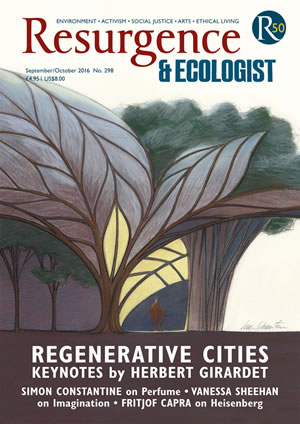I’m conflicted here. At one level, I really enjoyed Daniel Wahl’s Designing Regenerative Cultures, and I know that the majority of Resurgence & Ecologist readers will too. At another, it made me grind my teeth in frustration!
There’s so much distilled experience here that it’s hard to know where to start. First and foremost, it’s an extraordinary intellectual and analytical resource, providing as good a picture of contemporary holistic, systems-based thinking as you’re likely to find.
Wahl’s new book lays bare exactly what’s wrong with today’s economic orthodoxy (and the deeper worldviews that lie behind it), before pointing the way to today’s “regenerative solutions” – in the worlds of design, culture, agriculture, economics and finance
Along the way, the reader gets to know many of the key figures who feature so prominently in Wahl’s own personal pantheon – as he says, we should indeed be drawing down on more than 40 years of deep wisdom and “whole-systems understanding”. It’s inspiring stuff.
The heading of his first chapter (‘Why Change the Narrative Now?’) is authoritatively answered. And it’s salutary to be offered such a radically different take on today’s multiple, converging crises, which he sees as “symptoms of our pathological habit of understanding and experiencing ourselves as separate from nature”.
Through that lens, today’s economic orthodoxy is indeed “a dangerous ideology”, and our economic and monetary systems are indeed “structurally dysfunctional”. The social and environmental externalities of pursuing progress through exponential economic growth and unconstrained consumerism become clearer and more life-threatening by the day.
The contours of the kind of alternative, regenerative economy that we need so urgently are also eloquently outlined – with the emphasis on thoughtful, design-based solutions, resilience, ecoliteracy (“learning from living systems”), the circular economy, green chemistry, industrial ecology, and so on. Familiar stuff, but Wahl’s own applied work (with the International Futures Forum, for instance, and indeed through some of the projects that he’s pursued with my own organisation, Forum for the Future) keeps it grounded and relevant.
Wahl’s “listening out for wholeness” is therefore both intellectual and practical. It is not, as such, detached from today’s realities, in that he recognises unequivocally that our chances of creating regenerative cultures are slim without first creating more equitable cultures. And his idea of “caring for life as a whole” is inspiring:
By caring for the Earth, and all of life, we care for ourselves. By embracing our own nature as an expression of nature at large, humanity can become a conscious force of healing. Keeping the limits of our own knowing in mind, we can begin to humbly contribute to the flourishing rather than the impoverishment of life. Overcoming the pain and the isolation of the narrative of separation means learning to love ourselves in order to love life more fully.
But (and this is where the teeth-grinding kicks in!) no serious attempt is made to explain how this demonstrably preferable worldview is ever going to gain traction in the world as it is today. Any references to politics or politicians or political parties and systems are entirely tokenistic; one of Wahl’s chapters is headed “Activism Revisited”, but, notwithstanding his admiration for activists such as Vandana Shiva and Naomi Klein, there is no acknowledgement anywhere in the book that we’re battling today with a pathological super-privileged elite (the 1% of the 1%), who are not going anywhere any time soon. And they, of course, are entirely relaxed about the inchoate, permanently peripheralised movement that Wahl enthusiastically presents to us.
Which means that a sense of make-believe is never far away. Wahl asserts, for instance, that the “calls for degrowth” are getting louder all the time, forgetting that the original debate about limits to growth reverberated throughout mainstream politics throughout the 1970s, only to disappear almost without trace in the 1980s. And whilst it’s true that the “meme of ecologically inspired design” is indeed out there making gentle waves in the world of design, the mainstream worlds of design, engineering and business education have been unbelievably slow in responding to a physical world already transformed (largely for the worse) by today’s overlapping ecological disasters.
This becomes a real problem when we move on to many of the chunky areas. Whilst I can’t help but sympathise wholeheartedly with Wahl’s characterisation of just how radically we’re going to have to transform land use and agriculture, what’s missing is the clinical, politically honed insights of people like Colin Tudge, who’ve demonstrated time after time that today’s food production systems have little to do with providing people with healthy, nutritious and sustainable diets, but everything to do with the untrammelled pursuit of profit at almost any cost.
Let’s be honest about this. Most of those who embrace Wahl’s inspiring vision of a better world, built on an Earth-centric, compassionate, holistic worldview, have long since given up on contemporary politics. Most don’t belong to a political party; even fewer are actually out there campaigning or shouting out loud about what needs to happen.
Is that viable? As one of the few who are still up to their eyeballs in the politics of it all, I can’t help but wonder how this chronic disconnect will be resolved. And whilst I agree wholeheartedly with Wahl’s belief “that there is still a chance of making it through the eye of the needle”, I don’t believe that will happen if we remain so reluctant to confront the nature of contemporary power in today’s political and business elites.






